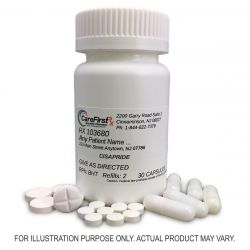Cisapride – It’s Multiple Uses in Cats
Cats are wonderful addition to our families but sometimes there are ‘unpleasant’ aspects of having a cat.
Many of you know what I am speaking of, and it usually involves stepping in ‘something’ with bare feet in the middle of the night. Hairballs and other contents of vomit are an unfortunate part of many cat fancier’s lives.
But did you know that hairballs are NOT a “normal” thing for cats to produce? Hairballs, when produced frequently (more than once a month) can be a sign that there is a problem in the digestive system.
If your cat has had issues with vomiting, regurgitation or hairballs, your veterinarian may have prescribed Cisapride.
Why Cisapride?
Cisapride is a “prokinetic” drug, which means that it will “get things moving” along in the gastrointestinal tract. It stimulates movement inthe pyloric section of the stomach and in the small intestines.2It may be prescribed if your cat suffers from:
- Esophagitis
- Hairballs
- Megaesophagus
- Delayed Stomach Emptying
- Regurgitation
- Constipation
Tasty Liquid Formulation
Cisapride is also no longer available outside compounding pharmacies. Cats are notorious for not wanting to take pills, especially if they taste bitter. At Care First Specialty Pharmacy, tasty liquid Cisapride suspensions are available. Our most popular flavors are tuna and poultry. Cats being treated for megaesophagus will especially benefit from this liquid suspension, as these cats can have difficulty swallowing pills.
Side Effects and Other Important Information
If your cat is taking other medications, such as amitriptyline or ketoconazole, please let your veterinarian and pharmacist know before giving Cisapride. Unwanted drug interactions can occur. Cats with liver disease or heart disease should be given Cisapride with caution.
If you or your veterinarian is concerned that your cat may have a foreign body obstruction (digestive blockage) with a toy, piece of string, etc., Cisapride should not be given.
Cisapride is safe at recommended doses and side effects are rare. When they do occur, vomiting, diarrhea, heart arrhythmias and abdominal discomfort may be noted.
References
1. Cannon, Martha. Hair Balls in Cats: A normal nuisance or a sign that something is wrong? J Feline Med Surg. January 2013;15(1):21-9.
2. Gaschen, Frederic. How I Use Motility Modifiers on the Clinic Floor. American College of Veterinary Internal Medicine Conference Proceedings 2015. Veterinary Information Network. Retrieved June 8, 2016.
3. Plumb, Donald C. Plumb’s Veterinary Drug Handbook. Eighth Edition Online, Veterinary Information Network. Cisapride. Last Revised January 1, 2015. Retrieved June 8, 2016.



Comments